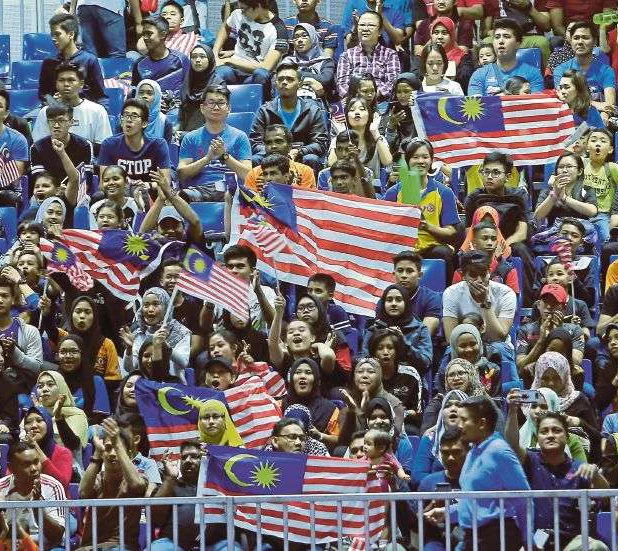ONE of the questions we are regularly asked by foreign visitors to the Institute of Strategic and
International Studies (ISIS) Malaysia seeking to understand Malaysia’s threat assessment and the regional strategic landscape is what the country considers its top-most defence and security challenge.
Often, the assumption is that this challenge is external, either from other states or from non-state actors operating across borders.
Malaysians may have different answers to this question, depending on who you ask. ISIS Malaysia does not take an institutional position on the matter.
No doubt, the country’s borders have been tested many times over. In recent times, they have been breached at sea and on land, most notably but not exceptionally during the Lahad Datu incursion of 2013. Malaysia’s borders will continue to be prodded and tested in all the domains we operate in — maritime, air, land, and cyber — by state and non-state actors.
However, ours is a country that generally considers all others friends and none enemies until proven otherwise. The fact that as we celebrate 60 years of Merdeka, we can also celebrate 60 years of diplomatic ties with 20 other countries from Cambodia to Canada, Indonesia to India, and the Netherlands to New Zealand says a lot about the friendships we have made and retained as a relatively young country.
Next month, Prime Minister Datuk Seri Najib Razak travels to Washington at the invitation of United States President Donald Trump to recharge bilateral cooperation steadily cultivated over six decades of across a suit of issues, and despite political fluxes.
These state-to-state relations are also what we rely on to counter non-state actors with criminal tendencies and extremist ideologies. While cross-border threats like terrorism are growing increasingly urgent, they are not altogether new in nature.
Contrary to popular jargon, terrorism is not so much a non-traditional security issue for us in this region but rather, a traditional one with the same threat having morphed into different forms by different groups of people repeatedly over the years.
This does not mean we let down our guard, of course. But, it does mean understanding the threat as a symptom and recognising that there are bigger causal factors.
The extremism that gives rise to terrorism is fanned, in parts, by marginalisation, intolerance, and rejection. This process of radicalisation becomes more profound in heterogeneous societies, in which minority groups assume greater vulnerability for their difference.
My conviction is that Malaysia’s foremost challenge emanates internally from the differences and divisions that are intrinsic to any multi-ethnic, multi-faith society.
It is why the nation-building project we now know as Malaysia continues to be as critical to our future as it was when the country was first known as Malaya.
The challenge of answering what it means to be Malaysian as a Malay, Chinese, Indian, Penan, Kelabit, Bajau or any combination of those and more; adhering to the world’s greatest faiths; and speaking different languages and dialects, will only become more pronounced as pressures of the 21st century pile onto these legacy issues of identity we have been grappling with since independence.
A state’s borders, after all, are only as secure as the coherence of its nation. Our bickering about who makes a Malaysian and which way we want to take the country in seems louder because we now have more space and freedom to do so. We need to figure out along the way how to talk to each other without talking over or past each other.
What we must also ensure is that our distinct ethnic identities do not supersede our nationality. The wisdom of our forefathers enabled the former to be preserved rather than masked.
We kept our ethnic names, dialects, cultural practices and choice of education not so we could assert superiority over the others within our own borders and definitely not so we could be picked apart by foreign powers claiming Malaysians as diaspora communities.
More practically, many of us cannot even begin to distinguish the parts of us that are ethnically distinct anymore. We trace our ancestry back all over Asia, if not the world, and many more of us are either products of, or a part of, mixed marriages now.
The 29th Southeast Asian Games that Kuala Lumpur is privileged to host proved a timely reminder as to just how strong we are as a single nation under one flag, literally and metaphorically.
If you watched any event in which a Malaysian competed, you would have seen Malaysians of different colours huddled under, or wildly waving, the national flag yelling in one voice. That one voice, screaming the country’s name or chanting, “Sehati Sejiwa” and reverberating throughout the stadium, is what it should mean to be Malaysian, especially to the rest of the world.
After all, the strength of the nation-state depends on the state of the nation. And there is no viable state without a coherent nation.
Selamat Hari Merdeka ke-60, Malaysia — Negaraku.
Article by Elina Noor which appeared in New Straits Times, 30 August 2017.





